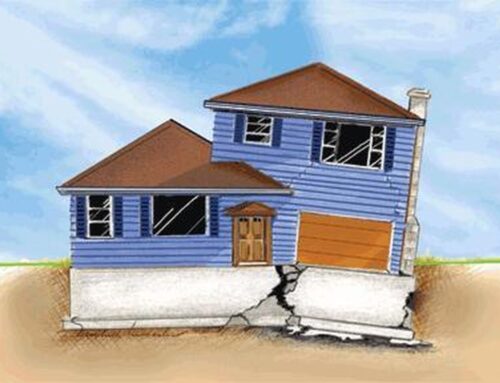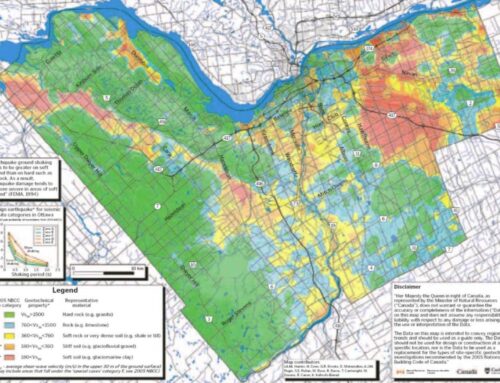Spot a crack in your foundation?
The first step to repairing a foundation crack is to identify what type of crack it is. Here are the 10 most common types.
1) Horizontal Cracks
Horizontal cracks in your basement foundation are serious. This type of crack is often due to unbalanced soil and hydrostatic water pressuring pressing against your foundation wall. You may notice the foundation bowing inwards and water leaking into your basement. Both block and poured foundations can develop horizontal cracks.
In Ottawa, horizontal cracks are common, they are found below grade where the frost line is located and often caused by the freezing and thawing cycle. Over time this can create unbalanced pressure on your foundation wall creating a horizontal crack.
Renco Tip: Call several foundation crack experts to get opinions and repair options ASAP. The good news is horizontal cracks can be permanently repaired with lifetime guarantees and transferrable warranties if you sell your home down the road.
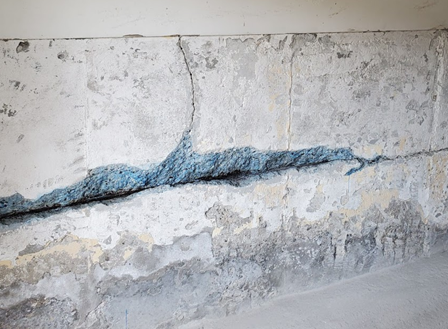
2) Stair Step Cracks.
Block foundations are prone to stair-step cracks. These types of cracks happen along mortar joints and pose a serious threat to the integrity of your basement foundation. There are two common causes of stair-step cracks:
- Foundation settlement or sinking in one area
- Moisture related problems outside your foundation
Renco Tip: If you can put more than a quarter in the foundation crack call for a contractor for a professional inspection and repair options. While some mortar-based hairline cracks are common, anything larger is posing a threat.

3) Hairline Cracks:
Hairline cracks are common in new construction foundations across the country. They usually appear within one year and caused by the settling and drying of the new foundation. The good news is these cracks are usually cosmetic and can be repaired by DIY homeowners for ~$200 or professionals for $400-$600.
Renco Tip: If you purchased a new home and discover a hairline foundation cracks contact your home builder. Your warranty may cover the repair of the hairline crack. Make sure to take photos to document the crack and monitor progression.

4) Vertical Cracks:
Vertical cracks in your foundation wall are less serious than horizontal cracks and do not pose a structural threat. They are commonly found in poured foundations running straight up and down your wall. In Ottawa, vertical cracks are one of the most crack types found in basements. They are caused by the foundation settling overtime or the natural concrete curing process
The most common repair for vertical cracks is an epoxy or polyurethane crack injection. DIY kits start at $75 and professional crack injections start at $400.
Renco Tip: If there is no moisture and you cannot fit a quarter in the crack there is no immediate threat. You can take photos and monitor crack or repair with epoxy injection.
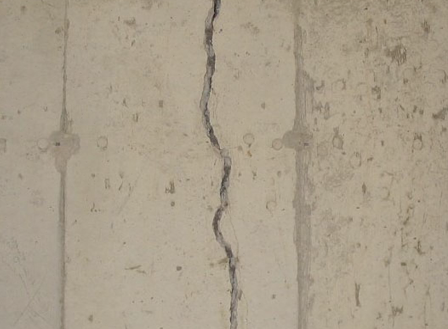
5) Diagonal Cracks:
Like vertical cracks, most diagonal foundation cracks do not pose a serious threat to the structural integrity of your foundation. They are found running a maximum 30 degrees of vertical and caused by the natural curing of the concrete foundation wall or settlement over time. The most common repair is epoxy crack injections, these crack repair costs range from $75 for DIY kits to $400 and up for professional crack repair.
Renco Tip: When you spot a diagonal crack snap a photo and document the date. If the crack is a hairline and a quarter cannot fit into it, you need not worry. Check back in 6 months, if the crack has continued to grow call a foundation professional for guidance.
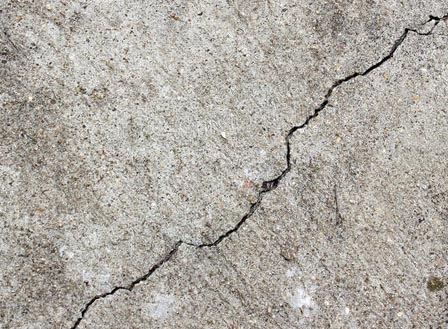
6) Shrinkage Crack:
Like hairline cracks, shrinkage foundation cracks happen when poured concrete foundations begin to dry out and lose moisture. New home builds are prone to shrinkage cracks within the first year. These cracks are often vertical and pose no structural threat to your foundation. The biggest risk is if you are in an area with high levels of Radon Gas that leak into your basement.
Renco Tip: If you are in a new home build, contact your builder about your home warranty. Shrinkage foundations may be covered. If not, snap a photo and document crack. If it grows or you discover more cracks investigate having an epoxy crack injection repair.
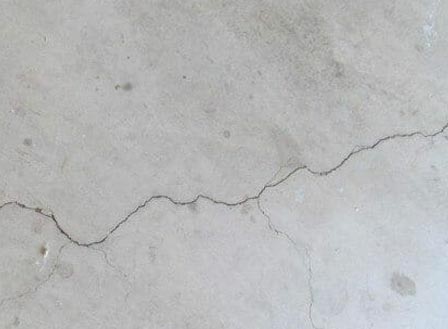
7) Foundation Slab Cracks:
Poured concrete slabs are prone to developing cracks over time. The challenge is understanding why the foundation slab crack occurred. There are three common reasons:
- Concrete Curing: The most common reason is the natural drying, settling, and curing of the concrete slab. This poses no structural threat and is mostly cosmetic.
- Slab Settlement: If a new foundation slab develops settlement issues you are in trouble. This may be caused by poor workmanship where the supporting ground was not compacted or poor soil conditions. Call a professional for an inspection right away.
- Frost Heave: Crawl space slab foundations that sit at or above grade are at risk of frost heave. During freezing, weather water underneath the slab can freeze causing the concrete to buckle
Renco Tip: If the crack is larger than a hairline, call a foundation expert to get on advice on the cause and options to repair.
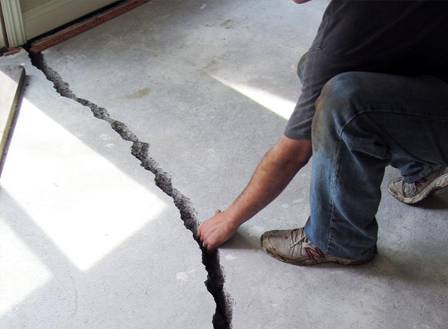
8) Non-Structural Foundation Crack
A non-structural foundation crack is one that does not pose a threat to the structure of the home, and typically only results in leaks during rainstorms or when snow is melting. Despite the lack of structural threat, water seeping into your basement is still a serious matter that requires attention.
Water leaking into your home can ruin your belongings, walls, floors and contribute to the growth of mold. Left unattended, these types of cracks may also get worse. If you don’t act fast to address a crack in your basement, no matter how insignificant it may seem, it’s only a matter of time before you find that water has entered your home.
Renco Tip: Concrete basement walls can have small cosmetic cracks due to the natural curing process. If your crack is between 1 to 2mm and runs vertical or diagonal it may be non-structural.
Unsure? Text or email Renco a photo of your foundation crack today.
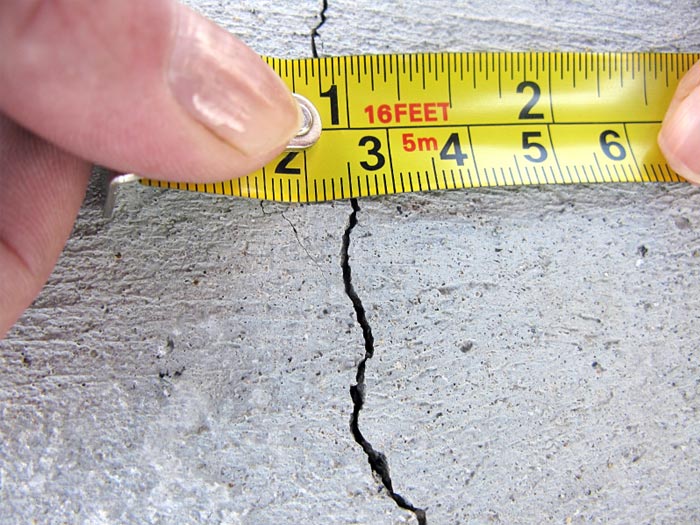
9) Wet Non-Structural Foundation Crack
This type of crack is the result of foundation shrinkage due to water evaporating from the concrete. It would typically happen within the first month after a foundation is poured. The wetter the concrete mix is initially, the more shrinkage will happen, increasing the likelihood of cracks forming. The natural setting of the concrete can also lead to cracks.
For foundation cracks that are wet and actively leaking, we normally use urethane as a sealant material. It’s a flexible substance that is easy to inject into the crack, and expands to fill the cavity when it comes into contact with water.
Renco Tip: If you spot water or moisture coming from a crack the faster you act the better. Ottawa’s quickly changing weather patterns can cause the crack to grow or lead to more water issues.
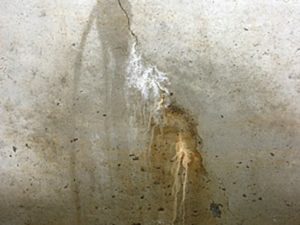
10) Structural Foundation Crack
These types of cracks are extremely serious as they pose a risk to the structural integrity of your home. Sure sign of a structural deficiency are horizontal cracks, and cracks wider than a 1/4 inch. Structural foundation cracks are normally the result of movement, whether it’s caused by temperature changes, soil pressure or soil shrinkage.
In this case, epoxy is the material of choice for repairing the crack. Because the crack was initially caused by stress resulting from movement which can continue, epoxy alone is not generally enough to ensure the repair of the crack. Further reinforcement, in the form of carbon fiber countersunk staples or straps, is often necessary to ensure that the crack does not expand.
Renco Tip: If you spot water or moisture coming from a crack the faster you act the better. Ottawa’s quickly changing weather patterns can cause the crack to grow or lead to more water issues.
If you think you have a structural foundation crack Text or email Renco a photo of your foundation crack today. We can access the damage and recommend a proven solution backed by our Renco home guarantee.
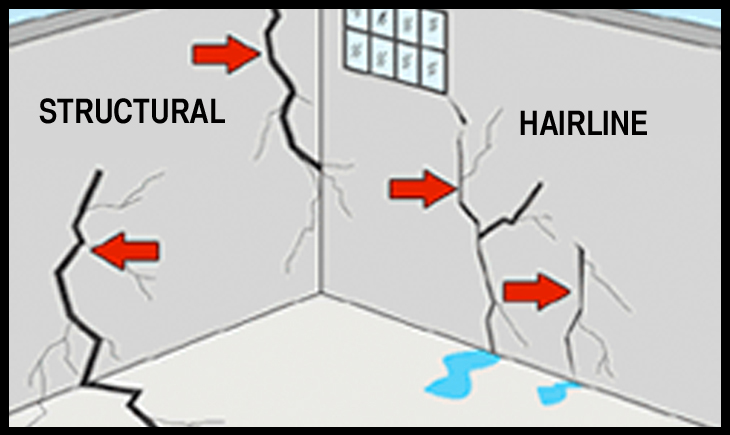
Get a foundation crack repair assessment today.
Fill out the form below and Renco will contact you within 24hrs to setup an appointment.
You can also text 613-859-9006 with your concerns, questions and photos.

